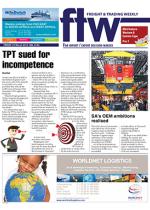Figures published by
the Eastern Cape
Gambling and Betting
board show that
gambling raised just over
R104 million in tax from
gaming and betting in the first
nine months of the 2014/15
year for the Eastern Cape
government. This made it one
of the biggest contributors to
the provincial fiscus, which is
almost totally dependent on
central government funding.
It is an apt metaphor for
the province’s approach to
investment – put all the money
on red (or black) and hope for
the best.
The logistics sector is
relegated to being observers in
the crowd rather than players
in the game.
This is evident in the relative
lack of growth in the sector in
the Eastern Cape, despite the
opening of the port of Ngqura
and the creation of the East
London and Coega Industrial
Development Zones.
Instead of waiting for the
jackpot to pay out Eastern
Cape freight forwarders,
clearing houses and logistics
suppliers have focused on
market niches – particularly
in the automotive and
agricultural sectors.
Some have become so good
at it that they have expanded
their operations into other
provinces.
One of the results of this
focus is that the logistics
industry has largely
disappeared off the public
radar, and it has no public voice
when it comes to commenting
on the bets the authorities
are making on behalf of
Eastern Cape business and the
province’s people.
At present the money is on
Project Mthombo – a proposed
oil refinery for the Coega
Industrial Development Zone
(IDZ).
Estimated costs have
escalated from R90 billion to
over R200 billion, and that
excludes the logistics premium
of transporting the finished
product to the main Gauteng
market. It will have to be
transhipped to Durban to be
pumped down the pipeline on
which Transnet has just spent
R20 billion.
Alternatively, the building
of a new pipeline from the
Eastern Cape has been
proposed – or the refined
product will have to travel by
rail and road. Both of these
alternatives leave the Durban
pipeline under-utilised.
Undeterred by these
logistical challenges the
Eastern Cape provincial
government, the Nelson
Mandela Bay Business
Chamber and the Coega
Industrial Development
Corporation have all put their
money on Mthombo, which at
best estimate will create 1 000
direct jobs when operational.
Very few of the required
skills for construction or the
running of the refinery are
currently available in the
Eastern Cape.
Previously all the money
was on a zinc smelter – which
is what led to the creation of
the Coega IDZ, followed by an
aluminium smelter – for which
the port of Ngqura was built.
Neither materialised, and years
of effort and opportunity were
lost.
The other big bet at present
is the export of manganese
from the Northern Cape
through Ngqura – another
priority of Coega, the business
chamber and local government
despite the fact that the exports
will create few additional jobs
in the Eastern Cape itself.
With a focus on the bulk rail
service between the Northern
Cape and Ngqura there is
little emphasis on improving
the freight link between the
Reef and Ngqura or Port
Elizabeth in order to support
manufacturing in the province
– an investment which would
also stimulate the provincial
logistics industry.
The money is on a powerhungry
manganese smelter in
what is now the Coega special
economic zone to create jobs.
Given the current state and
prospects of South Africa’s
power supply, investors
in either the refinery or
manganese smelter would
demand a risk premium if they
have any appetite at all for
processes that are reliant on
the continuous uninterrupted
supply of power.
Eastern Cape companies
involved in all aspects of the
logistics chain are surviving
– and in some cases growing
– by hedging their bets and
focusing on supporting the
sectors in which the province
has a natural competitive
advantage rather than waiting
for one big pay-out.
EC puts its money on Project Mthombo
27 Mar 2015 - by Ed Richardson
0 Comments
FTW - 27 Mar 15

27 Mar 2015
27 Mar 2015
27 Mar 2015
27 Mar 2015
27 Mar 2015
27 Mar 2015
27 Mar 2015
27 Mar 2015
27 Mar 2015
27 Mar 2015
Border Beat
Featured Jobs
New
